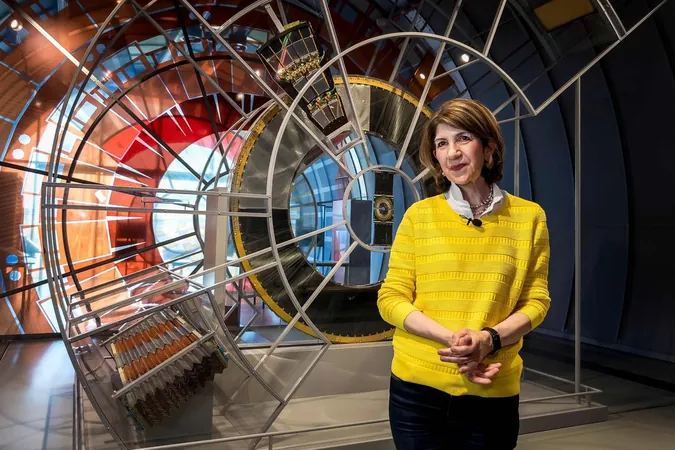
China's Ambition to Dominate Particle Physics: Could Europe Fall Behind?
2025-03-31
Author: Mei
The Future of Particle Physics in Europe
GENEVA – Fabiola Gianotti, the head of Europe’s prestigious Cern laboratory, has issued a stark warning regarding the future of particle physics in Europe. In a recent interview with AFP, she cautioned that without timely approval for a new particle collider, Europe risks losing its status as a leader in fundamental physics to China, which is rapidly advancing its own particle physics capabilities.
The Proposed Future Circular Collider (FCC)
The proposed Future Circular Collider (FCC) has garnered significant attention, yet it faces scrutiny from some scientists and government officials regarding its projected cost, estimated at over €15 billion (approximately S$20 billion). The German government, Cern's largest contributor, has expressed hesitance over the financial implications of such a massive undertaking. Gianotti acknowledged these reservations, drawing parallels to the initial skepticism surrounding the Large Hadron Collider (LHC) when it was being proposed. 'It’s certainly natural for member states to seek thorough cost assessments with minimal uncertainties before committing to such grand projects,' Gianotti explained.
Optimism Amid Challenges
Despite the challenges, Gianotti remains optimistic about continued support from the member states. She emphasized the importance of investing in science and technology during turbulent geopolitical times, saying, 'It’s crucial that we foster hope and opportunities for future generations.'
Private Sector Involvement
The question of private sector involvement in funding has also been raised. While Gianotti noted that private investments could provide additional resources, she insisted that the bulk of the funding must still come from government contributions to maintain control and direction over the project.
China's Competitive Landscape
With China’s ambition to build the world’s largest particle accelerator, Gianotti highlighted the competitive landscape in fundamental physics. Approximately 600 researchers from China are currently collaborating with Cern, illustrating both collaboration and competition. 'There’s a genuine risk that Europe could cede its leadership role in high-energy particle physics—a regrettable outcome,' she warned.
The Societal Impact of Particle Physics
But what does the FCC mean for everyday life? Gianotti pointed out the far-reaching benefits of particle physics to society. 'Our work in colliders expands our understanding of fundamental questions about existence—questions that have persisted since humans first inhabited the Earth,' she said. The advancements born from fundamental research often lead to significant technological innovations; for instance, the World Wide Web, cancer treatment accelerators, and PET scanners all originated from work done at Cern.
Criticism and Collaboration
Critics of the FCC have suggested that funding could be better allocated to smaller projects. In response, Gianotti acknowledged the natural competition between scientific disciplines but urged for a collaborative approach. 'Investing in science across various fields is essential. Money allocated to science will stay within the realm of science, while funds taken away will ultimately disappear into other sectors.'
The Stakes for Europe's Scientific Leadership
As Europe decides its path forward, the stakes are high. Not only is the future of scientific leadership on the line, but so is the continent’s commitment to innovation and technological advancement that benefits society as a whole. As Gianotti states, the quest for knowledge is not just an academic pursuit but a fundamental human endeavor. The outcome of the FCC decision will likely resonate far beyond the halls of Cern, impacting generations to come.



 Brasil (PT)
Brasil (PT)
 Canada (EN)
Canada (EN)
 Chile (ES)
Chile (ES)
 Česko (CS)
Česko (CS)
 대한민국 (KO)
대한민국 (KO)
 España (ES)
España (ES)
 France (FR)
France (FR)
 Hong Kong (EN)
Hong Kong (EN)
 Italia (IT)
Italia (IT)
 日本 (JA)
日本 (JA)
 Magyarország (HU)
Magyarország (HU)
 Norge (NO)
Norge (NO)
 Polska (PL)
Polska (PL)
 Schweiz (DE)
Schweiz (DE)
 Singapore (EN)
Singapore (EN)
 Sverige (SV)
Sverige (SV)
 Suomi (FI)
Suomi (FI)
 Türkiye (TR)
Türkiye (TR)
 الإمارات العربية المتحدة (AR)
الإمارات العربية المتحدة (AR)